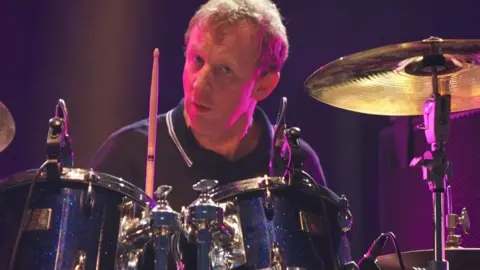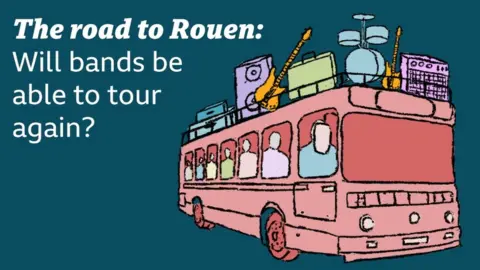UK stars call on government to act over post-Brexit touring
 Getty Images
Getty ImagesStars including Radiohead, Biffy Clyro and Ghostpoet are urging the government to make touring Europe easier, to prevent "the collapse of the industry".
Post-Brexit restrictions mean UK artists will face red tape and fees for visas to play in some EU countries.
More than 200 artists have joined the #LetTheMusicMove campaign - which says artists at every level are considering whether to book tour dates in the EU.
They say the restrictions "threaten the future success of British music".
The campaign's organiser, the Featured Artists' Coalition, says that, in 2019, UK artists played almost four times as many shows in the EU than they did in North America.
It is asking for the government to deliver "transitional support package" to cover new and additional costs of touring, measures to overcome restrictions on transporting instruments and stage equipment, and a promise that EU artists will have reciprocal freedoms.
A separate group of musicians including Duran Duran, Massive Attack and Fatboy Slim have signed an open letter urging the prime minister "to fix this crisis facing our industry".
 Getty Images
Getty ImagesBlur's Dave Rowntree, who is backing the #LetTheMusicMove campaign, said: "There's no other plan. If we don't do something the music industry now collapses. We're at that inflection point."
Primal Scream's Simone Marie Butler added: "Live music is an incredibly important part of people's lives and this is essentially starving a big part of live music. We've faced difficulties with Covid-19, we're also dealing with the difficulties of [making money from] streaming.
"There are lots of strangleholds on the music industry right now."
The Department for Digital, Culture, Media and Sport (DCMS) said it had been talking to representatives from the industry, had clarified that instruments won't need a carnet, and had published specific "landing pages" to assist with visas and necessary documents.
"We want performers and other creative professionals to be able to tour easily abroad," the DCMS said.
 Getty Images
Getty Images"Short-term, temporary visits for paid performances by UK performers are possible in at least 17 EU countries, including France, Germany and the Netherlands, without needing visas or work permits," the DCMS said.
However, entertainment union Bectu said there were still "varying degrees of bureaucracy" in those countries, and that the government's statement doesn't "quite match up to the expectation that you can do what you could before".
Touring money
Tour managers are currently trying to navigate the Brexit rules, which include visa costs, working permits, haulage and a goods passport - known as a carnet - in the hope of booking festival and tour dates across Europe.
Rowntree explained: "Before Brexit, we, the industry, were promised by the government, 'Don't worry, we've sorted it all, we've got your back, we understand your concerns, we're going to deal with it'. They didn't.
"So, we the industry, talked to the government post-Brexit and expressed our concerns. Boris even said 'Don't worry, I'm as concerned as you are, I'll fix it'.
"The fishermen got £23m to deal with their concerns. We were promised something similar. Nothing."
The live music industry is estimated to employ 30,000 people in the UK, and it is estimated that 80% of the touring buses that operate across the UK and Europe are based on British shores.
There has been an ongoing row over who is responsible for the current situation.
In February, Culture Secretary Oliver Dowden laid the blame with the EU, calling the restrictions on musicians "absurd and self-defeating". The EU insisted it was the UK government that was at fault, saying ministers had rejected plans to allow journalists, performers and musicians a greater degree of freedom when working in the bloc.

A new touring deal has recently been signed between the UK, Norway, Iceland and Liechtenstein, where artists and crew can travel as short-term business visitors, which the government says is based on a deal the EU turned down.
But Simone says those countries, although they are happy to tour them, "aren't touring hotspots in Europe, and to tour Liechtenstein is a bit Spinal Tap".
The DCMS said: "We recognise the difficulties still being faced by the sector. That is why we are working closely with individual member states to encourage them to adopt a more flexible approach, in line with the UK's own rules which allow creative professionals to tour easily here."

Over the next few months, BBC News will be following tour managers as they try to plan their tour dates for 2021 and 2022, to learn more about the obstacles, bottlenecks and successes.
Ross Patel is the co-founder and CEO of Whole Entertainment and is band manager for Elder Island. He thinks there will be a gradual decline of British bands touring Europe - and European artists touring the UK - if change doesn't happen.
It will, he says, affect festivals' ability to book acts, and bands' ability to make new music.
Currently, the biggest problem for Ross is cabotage rules, which say trucks are only allowed three stops within the EU in seven days, before having to return to the UK.
 Whole Management
Whole ManagementPreviously, touring acts would load their gear into a vehicle in the UK - where about 80% of touring vehicles originate - and take it across the continent without hindrance. Even artists from the United States or Europe, would tend to hire vehicles from the UK, but that is no longer possible.
New trade regulations mean the vehicle, after dropping off the band or crew or kit, has to be driven back to the UK empty - incurring an additional cost. Once in Europe, bands will have to hire an EU-registered vehicle to transport their kit and crew.
At the end of the tour, you either drive that vehicle back into the UK and return it to Europe empty; or get a UK-registered vehicle back over to Europe to bring the equipment home. Either way, that could mean double ferry costs and other expenses.
Ross says there's currently a shortage of hauliers. People haven't been able to get licences to drive in the EU, and thanks to Covid, many drivers have changed profession because they didn't have any work. Some haulage companies have gone bust because there was nothing to support them.
Ross highlights another big and expensive problem. Getting a Spanish visa.
"It's an incredibly bureaucratic, riddled with red tape, and by far the most complicated visa application that anyone has ever had to do. And it's incredibly expensive," he says.
"With the visa application fees and the legal fees, it looks like it is somewhere between £450 and £550 per person. And that could just be for one show."
One of Ross's bands, Bristol-based trio Elder Island, has two Spanish shows planned. "But it means those shows won't turn a profit which means the whole tour is now not going to turn a profit.
"The whole tour, which was going to make a profit-pre Brexit, is now making a loss."

Follow us on Facebook, on Twitter @BBCNewsEnts, or on Instagram at bbcnewsents. If you have a story suggestion email [email protected].
